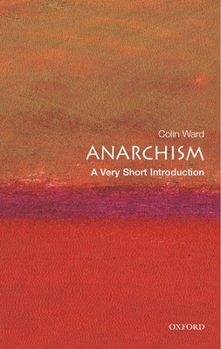Anarchism: A Very Short Introduction
(Part of the Very Short Introductions Series, Oxford's Very Short Introductions series Series, and Very Short Introductions Series)
Select Format
Select Condition 
Book Overview
What do anarchists want? It seems easier to classify them by what they don't want, namely, the organizations of the State, and to identify them with rioting and protest rather than with any coherent ideology. But with demonstrations like those against the World Bank and the International
Monetary Fund being blamed on anarchists, it is clear that an explanation of what they do stand for is long overdue. Colin Ward provides answers to these questions by considering anarchism from a variety of perspectives: theoretical, historical, and international, and by exploring key anarchist thinkers, from Kropotkin to Chomsky. He looks critically at anarchism by evaluating key ideas within it, such as its
blanket opposition to incarceration, and policy of "no compromise" with the apparatus of political decision-making. Can anarchy ever function effectively as a political force? Is it more "organized" and "reasonable" than is currently perceived? Whatever the politics of the reader, Ward's argument
ensures that anarchism will be much better understood after experiencing this book.
Monetary Fund being blamed on anarchists, it is clear that an explanation of what they do stand for is long overdue. Colin Ward provides answers to these questions by considering anarchism from a variety of perspectives: theoretical, historical, and international, and by exploring key anarchist thinkers, from Kropotkin to Chomsky. He looks critically at anarchism by evaluating key ideas within it, such as its
blanket opposition to incarceration, and policy of "no compromise" with the apparatus of political decision-making. Can anarchy ever function effectively as a political force? Is it more "organized" and "reasonable" than is currently perceived? Whatever the politics of the reader, Ward's argument
ensures that anarchism will be much better understood after experiencing this book.
Format:Paperback
Language:English
ISBN:0192804774
ISBN13:9780192804778
Release Date:January 2004
Publisher:Oxford University Press
Length:126 Pages
Weight:0.25 lbs.
Dimensions:0.3" x 4.4" x 6.8"
Customer Reviews
4 ratings
Excellent
Published by Thriftbooks.com User , 15 years ago
Concise, does not require a PHD to read and understand (it is well written actually), a very good read. Enjoyed it a lot. A great introduction to the topic.
Brief But Well Written
Published by Thriftbooks.com User , 16 years ago
I am fairly new to the idea of anarchism and I thought Colin Ward's book was well written and gave a brief, but decent, look at the ideas that make up anarchism, and some of its major writers, such as Michael Bakunin and Emma Goldman. I thought the parts of the book that gave several examples in which anarchists were very influential in different events in history was very interesting. Ward briefly discuses the various branches of anarchist thought, like Anarcho-syndicalism and Pacifist anarchism, but only gives lip service to these. Ward's main focus seems to be the communistic-like version of anarchism. I thought the book was very well written and contained a good amount of information for such a short book. I think it's a good starting place for anyone wanting to learn about this political philosophy, but I'd recommend looking to other sources for more in depth information; especially on the other forms of anarchism.
Just what it says
Published by Thriftbooks.com User , 17 years ago
A Very Short Introduction on anarchism by Colin Ward is just what it says. A short history with just enough details to allow the reader to understand the many types of anarchism that are out there. A list of books for further reading and the references allow you to easily expand your knowledge on whatever type of anarchism that you wish to know about. From their ideas about education to the environment, anarchists are everywhere.
Provocative
Published by Thriftbooks.com User , 18 years ago
Ward quotes Martin Buber: "All forms of government has this in common: each possesses more power than is required by the given conditions." Buber calls this this "political surplus". One only has to look around the world to see how such political surplus is spent. I was surprised at the extent of anarchist influence. Ward devotes 4 pages to how anarchism functioned practically is Spain in the 1930's, where 3 million people were organized in anarchist communes. Anarchists have been at the forefront of considering ecological sustainability. Ward cites authors who believe that anarchism is the only approach that can meet the ecological challenges we face. Given the problems socialism has faced, Ward argues it is too soon to write off anarchism when looking for alternatives to present forms of government. We may have been taught little about anarchism except to be dismissive of it, but Ward's book is an excellent start to understanding what anarchism offers. There are many references to the works of anarchists. If capitalism seems to work, albeit at a considerable ecological cost, the growing ecological crises may force us within our lifetimes to explore alternative ways of living. Socialism may not be a big enough change, retaining as it does a strong central government with its own political surplus. If you think you can manage more political participation that casting a vote every few years, anarchism may be worth studying.





